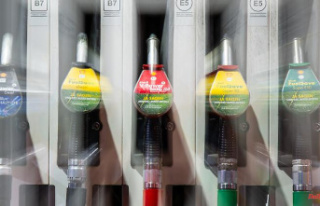Since the President of the Federal Network Agency, Klaus Müller, has been in office, his work has revolved around the effects of the Russian war of aggression on the gas markets. If the worst comes to the worst, he has to decide who gets natural gas and who doesn't. But who is the man?
A few days after the start of the Russian war of aggression in Ukraine, Klaus Müller took over the post of President of the Federal Network Agency. That was almost six months ago now. In the gas crisis, half a year can go by quickly. Looking back, Müller describes the time as "hard and instructive".
Hardly a day goes by when the graduate economist doesn't explain the latest storage levels, import quantities or savings targets in an interview, on a talk show or personally on Twitter - rarely without a serious warning and yet never in a lecturing manner. So far, gas consumption is 14 percent lower than in the same period last year, he says around the end of July. But the goal is 20 percent: "It still has to be packed up a notch." Everyone understands that.
Müller comes from Wuppertal. In 1990 he graduated from high school there and joined the Greens. In 1991 he came to Bonn for the first time to do community service. After studying economics in Kiel, he was employed at the Schleswig-Holstein Investment Bank from 1998. At the same time, he made a career for the Greens in Schleswig-Holstein: from 1994 to 1997 he was their state board spokesman. In 1996 he led the talks on the green side in the red-green coalition negotiations - as a 25-year-old.
After two years in the Bundestag from 1998, initially in Bonn, he became environment minister in Schleswig-Holstein in 2000 - at the age of 29. Prime Minister at that time was Heide Simonis. In 2006 he resigned from all political offices and became head of the consumer advice center in North Rhine-Westphalia. In 2014 he moved to Berlin as Germany's top consumer advocate at the Federal Association of Consumer Advice Centers. Finally he gets a call from Economics Minister Robert Habeck. The party friend suggests his new job to him. On March 1, a few days after the start of the Russian attack on Ukraine, Müller starts in Bonn as the successor to Jochen Homann, who is retiring.
Since then, the 51-year-old has been Germany's top network regulator in the areas of electricity and gas, telecommunications, post and railways. Almost 3,000 people work in his agency. "This institution is at the heart of the issues of our time," he says in a video on the first day of his term. At that time he meant above all the energy transition and digitization. Little did he know that half a year later, as a precaution, he would have set up two operational situation centers for gas and electricity emergencies.
Since then, the effects of the war on the gas markets and the supply and storage behavior of the Russian supplier Gazprom have made up a large part of his work. "The Federal Network Agency has a broad base, which is very, very appealing. But I definitely have a gas list," he says. Also in terms of time: He has not been on vacation since March. At the moment it is also “not really” responsible. Is it possible in autumn? "I dont know."
He can sleep well, says Müller. In his previous jobs, too, he had a few tasks that were not stress-free. "I once had to designate large nature reserves and bird sanctuaries. I once organized a larger class action lawsuit against Volkswagen." That was also "not without it". "The current situation is special and special, no question. But I have a great team. I'm not doing it all alone."
And Heide Simonis? "I learned a lot from her." He always found it fascinating how she made and explained politics. "She was always one who said: You have to explain what you're doing. If you don't explain to people what you're doing, if you're not transparent in your actions, then you lose them."
Müller is quick to come to terms with himself: "I think a free society has the right and also the responsibility to know how it is doing." This applies, for example, to the publication of gas storage levels, "to then understand why certain things have to be changed, why there have to be certain restrictions, why gas costs so much".
Müller does not want to read anything about his family circumstances in the media. However, during the interview in his Bonn office, he reveals a bit of his private life: for example, that he likes paragliding and diving. "Last year I did a thermal technique course. When you find a proper source, it's a very, very nice feeling." And then he remembers something important: "I like to bake and cook. And I actually bake quite well."












